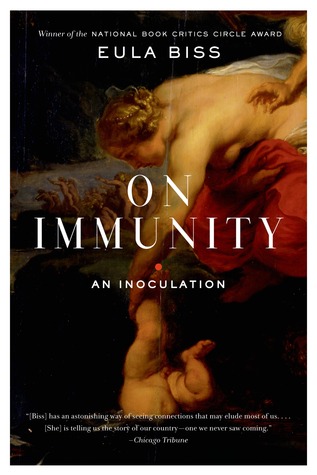“Some prefer to assume health as an identity. I am healthy, we tell each other, meaning that we eat certain foods and avoid others, that we exercise and do not smoke. Health, it is implied, is the reward for living the way we live, and lifestyle is its own variety of immunity.
When health becomes an identity, sickness becomes not something that happens to you, but who you are. Your style of life, I gleaned from the way the word lifestyle was used in junior high school health class, is either clean or dirty, safe or unsafe, free of disease or prone to disease...
...My generation came of age in the shadow of the AIDS epidemic, and it seems to have left us believing not that we are all vulnerable to disease, but that it is possible to avoid disease by living a cautious life and limiting our contact with others.”
Eula Biss's thoughtful book is not a pro-vaccination polemic (although I certainly enjoy such polemics, and if you also enjoy them, I thoroughly recommend Paul Offit to you). Rather, it is a meditation on health and disease in the tradition of Susan Sontag's classic essays "Illness as Metaphor" and "AIDS and its Metaphors." (I also recommend Susan Sontag. Strongly!)
What I liked most about Biss's work was how explicitly she called out the classism that pervades the anti-vaccine movement.
Among many anti-vaxxers, there is a sense that 'we don't need those dirty vaccines' because 'we're healthy, protected by the benefits of our [middle class] lifestyle.'
Anyone who has spent much time listening to the anti-vax community has heard this sort of sentiment, but I really loved how Biss laid it out so clearly for me, tying it explicitly to the classist tropes of previous generations (such as, for instance, the belief that disease was caused by "filth," usually among the lower classes, tenements, etc.)
Some things irritated me here, too. Biss veered into the genre of the Overwrought Mother a bit too much for me. She describes sleeping with her son's baby monitor pressed desperately to her ear, having a teary meltdown over possible toxins in his mattress, and being absorbed by the minutiae of his safety generally.
Now granted, these stories are adduced in support of her central narrative: that fear of vaccines is tied into our wider cultural fears, especially the (largely white, middle-class, privileged) fears of "contamination" and "toxins."
Something about the way she did it still bothered me, though. Even as she acknowledged her privilege (if toxins in the mattress are your biggest child-raising worry, you've got it good), it still plays into the endlessly repeated trope of the irrational mother consumed with obsessional fears about her child -- with a quiet implication that that's what makes a good and loving mother.
Overall, though, this was a very thoughtful book that I recommend -- but Susan Sontag is still better (high bar to clear, I know!)

No comments:
Post a Comment